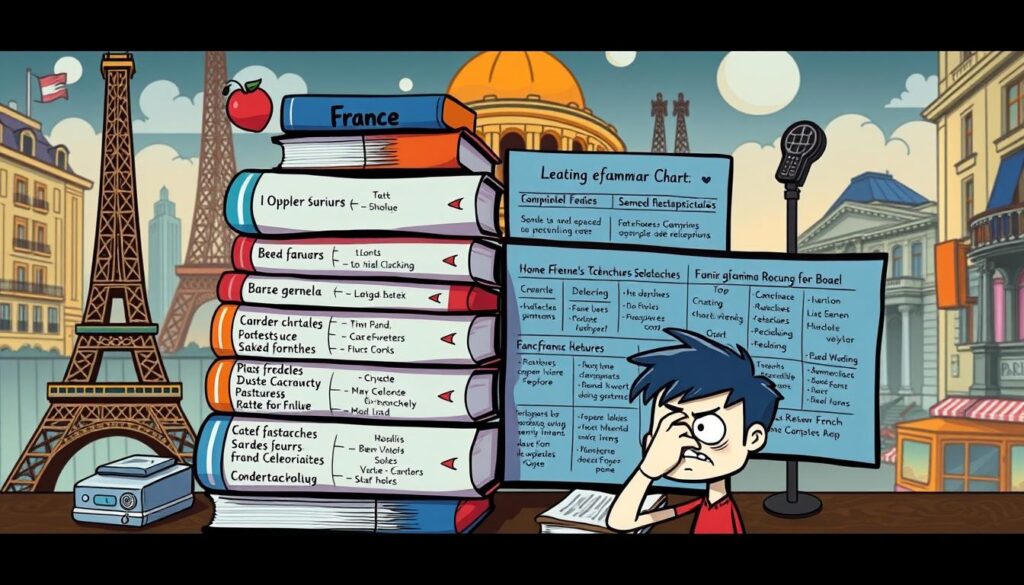Are you thinking of becoming a Canadian citizen? You might ask, “do you need to know French?” No, you don’t have to be fluent in French. But, you do need to be good at either English or French. This helps in talking to people, fitting in, and being active in society.
Living in Quebec or another province, you should know an official language. It’s important for your citizenship journey.
In Canada, being bilingual is often talked about. In Quebec, you might need some French for citizenship. But across Canada, you must know English or French. This is for those dreaming of a new life here. You can prove this with language course certificates or test scores.
Are you between 18 and 54 years old? You must show you can speak and understand English or French well. You should be at level 4 or higher of the Canadian Language Benchmark (CLB). This means you can handle daily conversations and follow simple instructions. It’s key for living in Canada. And don’t forget, applying for citizenship comes with a fee and required documents, including your language proof.
Some may get a pass for medical reasons. But exceptions are rare. They need strong evidence. Rules from Immigration, Refugees and Citizenship Canada (IRCC) are clear. Since fall 2012, showing you can speak English or French is a must.
Finally, don’t worry about language hurdles. You don’t need perfect French. But knowing an official language well helps a lot. It makes becoming a Canadian citizen easier.
Understanding Canadian Citizenship Language Requirements
Canada thinks it’s very important for those wanting citizenship to meet certain Canadian citizenship language requirements. If you are applying soon or planning ahead, it’s key to know what these requirements are.
The Role of Official Languages in Canadian Citizenship
Canada is bilingual and sees English and French as key languages. If you want to become a citizen, you must know one of these languages. This knowledge is crucial for fitting into Canadian life, helping with daily talks and getting government help.
Language Proficiency Standards for Citizenship Applicants
Applicants aged 18 to 54 must show they know enough language proficiency for Canadian citizenship. They need to reach at least Level 4 in the Canadian Language Benchmarks (CLB) or in French, the Niveaux de compétence linguistique canadiens (NCLC). Level 4 means they can understand simple talks, answer easy questions, and know daily words.
Eligibility Age Range: Who Must Meet the Language Criteria?
Applicants between 18 and 54 must meet the language levels needed. But, those 55 and older or under 18 are exempt. This rule understands different challenges and needs in learning and integrating based on age.
If you are getting ready for these language needs, check out LanguageYard. It offers insights and resources to grasp the language levels you need to achieve.
Do You Need to Know French for Canadian Citizenship?
You don’t have to know French to become a Canadian citizen. But, you must show you’re good in either French or English. It’s key to meet this need whether you’re proving your french language skills for Canadian citizenship or your English ability.
To prove you’re good in a language, taking a French language test for Canadian citizenship is one way. Immigration, Refugees and Citizenship Canada (IRCC) accepts several tests. For French, options include TEF, TEFAQ, DALF, DELF, TCF, and TCFQ. Your score must be at least at Canadian Language Benchmark (CLB) Level 4 or more.
Certain ages need to prove their language skills:
- People aged 18 to 54 must show they can use English or French well.
- Those younger than 18 and older than 54 don’t have to prove this.
You can prove your language skills with different documents. These can be diplomas, transcripts, or certificates from programs in English or French. When applying for citizenship, your french language skills for Canadian citizenship might be tested. This test could include both written and oral parts, based on the “Discover Canada” brochure.
To sum up, you don’t need to know French for Canadian citizenship. But, you must prove you’re proficient in either French or English. This includes passing a French language test for Canadian citizenship or showing other proof. It’s crucial for your application.
Exploring the Canadian Language Benchmarks (CLB)
The Canadian Language Benchmarks (CLB) help people understand language skills needed for Canadian citizenship. They give a clear picture of someone’s abilities in listening, speaking, reading, and writing. The CLB system has 10 levels and is used all over Canada.
What the CLB Level 4 Means for Citizenship Candidates
CLB Level 4 is the basic language level needed for everyday simple talks. To apply for Canadian citizenship, you need to reach this level. It shows you can follow instructions, answer basic questions, and talk about yourself simply.
Assessing Your Language Proficiency for Citizenship
To check if you meet the CLB levels, you might take tests like IELTS or CELPIP. These exams check your skills in the four main language areas. They match their scores with the CLB levels to keep things fair for everyone.
Knowing your test scores and their CLB levels is key. The table below shows how scores from different tests compare to CLB levels:
| Test | Speaking | Listening | Reading | Writing |
|---|---|---|---|---|
| IELTS | up to 9 points | up to 9 points | up to 9 points | up to 9 points |
| CELPIP | up to 10 points | up to 10 points | up to 10 points | up to 10 points |
| TCF Canada | up to 20 points | up to 20 points | up to 699 points | up to 699 points |
Knowing these scores helps you prepare for the Canadian citizenship language test. The government gives resources to help immigrants and residents get ready. They ensure you meet the needed benchmarks for immigration or citizenship.
Language Proof Submission: Documents You Need
When you apply for Canadian citizenship, it’s important to know about language proof. You need to show you’re good at English or French. This has to be done the right way to meet the requirements of Immigration, Refugees and Citizenship Canada (IRCC).
Important documents are your diplomas, certificates, or school transcripts. These should be from places where they teach in English or French, like York University or the University of Waterloo. Make sure these papers show you fully finished the program.
Remember, individual language courses or Canadian trade certificates without a corresponding diploma are not adequate as language proof for Canadian citizenship.
If your school papers are not in English or French, you’ll need translated versions. Certified translations make sure your papers are clear for the citizenship language check.
- Educational certificates, diplomas, or transcripts
- Certified translations (if original documents are not in English or French)
Language proof is needed if you’re between 18 and 54 years old. You have to prove you’re at least at a Canadian Language Benchmark (CLB) level 4 to apply for citizenship.
| Requirement | Description |
|---|---|
| Age Range | 18 to 54 years old |
| Language Proof Options | Diploma, Certificate, Transcripts, or Certified Test Results |
| Minimum Language Level | CLB Level 4 or higher |
| Accepted Language Tests | CELPIP-G, IELTS, TEF, TEFAQ, DALF, DELF, TCF, TCFQ |
Getting the right documents ready as language proof for Canadian citizenship will help your application. It shows you’re ready and qualified for the perks and duties of being a Canadian citizen.
Navigating the Language Assessment for Canadian Citizenship
Understanding language proficiency requirements is key when applying for Canadian citizenship. It’s easier if you know what steps to take and what documents you need.
Requirements for Proof of Language Proficiency
To become a Canadian citizen, you must show you understand English or French well. You need to meet the Canadian Language Benchmark (CLB) level 4. You can do this with language test results or certificates from educational programs in English or French. Check here for more details.
Acceptable Evidence of Education in English or French
To skip the language test for Canadian citizenship, you need educational documents. Diplomas or transcripts from Canadian or equivalent foreign institutions show you’ve studied in English or French. They prove your language skills.
How Certified Translations Impact Your Application
If your documents aren’t in English or French, you need certified translations. Good translations make your application stronger. Bad translations or not having them certified can cause delays or harm your application.
Remember, showing strong language proficiency is essential. It supports your request for a language test exemption. It also helps speed up your citizenship application.
Alternative Ways to Prove Language Skills for Canadian Citizenship
Being born overseas and seeking Canadian citizenship is common for 25% of Canadians. Proving your ability in English or French is crucial. Since 2012, adults from 18 to 54 must meet a certain language level. But, if standard tests don’t work for you, there are other ways to show your skills.
Aside from the usual tests like CELPIP and IELTS, each province offers unique support. Programs like LINC or provincial assessments can help. In Quebec, the TCF or DELF are good options for French. Places like Manitoba accept language reports for citizenship. Your schooling in English or French can also help, especially if you’ve scored at least 6.5 in IELTS. Knowing French, spoken by 23% of Canadians, is definitely a plus. Check out learning French for more insights.
Make sure you meet all language requirements before you apply for citizenship. This can prevent application rejection or retesting. If you can’t meet these due to a medical condition, you might get an exemption. With proper preparation and documents, you can prove your language skills easily. This helps you move closer to getting Canadian citizenship.


